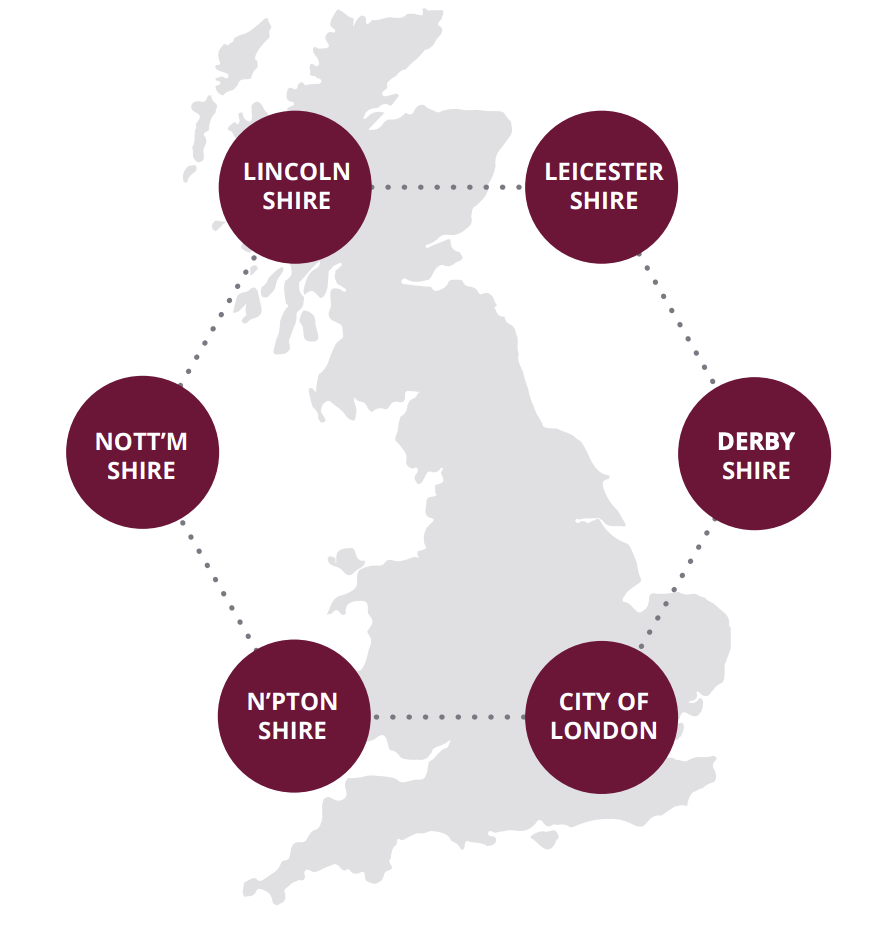
East Midlands Police Collaboration and City of London Police

Innovation and improvement
Six Forces lead the way in creating an accurate police records system and MoPI compliant RRD process. Lincolnshire Police’s innovative and automated system sets the standard and is now used by five other forces.
Executive summary
Following the Home Office backing of their RRD process, five other forces joined Lincolnshire Police in formalising their RRD and improving the accuracy and quality of their data. Infoshare+ was chosen as the technology partner; our software was chosen to clean the forces data and work with their in-house system Genie to perform the RRD process. As a result, all six forces were able to become fully MoPI compliant, and with their newly accurate and complete data were able to reduce risk to officers and senior decision makers, as well as better protect the public.
The challenge
All UK police forces are required by the Home Office to ensure that they are handling their data appropriately; regularly reviewing whether it is still needed and deleting if it no longer serves a policing purpose. These Review, Retention and Disposal (RRD) procedures are generally done manually and can be an incredibly time consuming task, especially when considering the sheer amount of information forces will hold in their numerous policing systems and databases.
Due to the wealth of data every force will hold and the ongoing nature of changes and additions to active police information, data quality issues (e.g. duplicate records, data errors, etc.) are an ever-present issue; forces can spend immeasurable time and resource trying to keep their data accurate. Aside from the compliance implications of incorrect data, interventions for vulnerable adults and children at risk can be delayed and public protection put at risk.
The original project with Lincolnshire Police
Lincolnshire Police responded to the challenges by creating an RRD and data quality team. The team was tasked with finding a more cost-effective and efficient way of ensuring their data and RRD process is MoPI compliant and their data quality was improved to aid operational policing.
All forces will have numerous systems in place for different policing functions and most will have a police records management system to manage police information. In their case, Lincolnshire used a system called NICHE to store and manage their police information.
Data quality solution
We were chosen to help improve the quality of data for Lincolnshire Police, using our ClearCore technology. It cleans the data held within their NICHE system daily; highlighting errors and duplications and matching any related records. Due to the unique, evidence-based match process we use, cases are picked up that may have been missed by other probability-based matching and highlighted for review by the team after each daily cleanse. This helped Lincolnshire to assess any and all matches for records that may relate to a nominal, address, vehicle or event and create a single record containing all relevant data, removing any incorrect or duplicated information.
RRD solution
The RRD solution was achieved using a combination of two systems for Lincolnshire Police: our ClearCore technology and their in-house system Genie. This iteration of Genie was developed by Lincolnshire Police and it allows all officers – from the RRD team to operational staff – to view any and all information they hold about any Person, Object, Location or Event (POLE). One of the main roles of Genie is to support the automation of Lincolnshire’s RRD process. Genie examines the data in NICHE and makes one of three decisions: (1) keep, (2) automatic disposal or (3) highlight for review. In order to ensure the accuracy and completeness of the RRD process, the data in NICHE is first analysed by ClearCore. This means the RRD reviews being made, whether automatic or the ones earmarked for manual review, are being done so on a complete view of all available information, supporting informed decision making in all regards.
Home Office approval of Lincolnshire’s RRD process
The two Home Office Inquiries that assess a force’s MoPI and RRD compliance are the Undercover Policing Inquiry and the Independent Inquiry into Child Sexual Abuse (IICSA). The consequences of non-compliance can be severe and significant and are a genuine concern for all forces. Deleting information can be risky if there isn’t the confidence in the decision making process.
Both Inquiries have reviewed Lincolnshire’s RRD process that includes ClearCore and Genie and given their explicit approval that it is fully compliant.
Testimonial
The Home Office approval of our process is a proud recognition of the enormous consideration we put into creating an RRD process that is both automated and highly accurate. The fact that it is considered fully compliant is the icing on the cake; the most important outcome of this project is that we’re able to accurately judge which data is needed and which can be deleted so that we’re only using the most up to date information to inform our decision making.
Simon Mumford, Regional RRD & Data Quality Manager
The Six-Force Collaboration
Following the success of Lincolnshire’s data quality and RRD procedure, and its Home Office rubber stamp, five other forces looking to improve their operational policing and implement a compliant RRD process joined them in a wider application of the project: Nottinghamshire, Northamptonshire, Leicestershire, Derbyshire and the City of London. The combined six forces agreed to share their data with one another within NICHE and Lincolnshire’s team ran both the Data Quality and RRD processes for all forces. Due to the collaborative nature of the project, the wider data set now available due to inter-force sharing meant that new RRD cases could be highlighted for review, more errors and duplications could be identified for correction and more records could be matched across forces.

2018 results – a year in numbers
During 2018 the team completed 99,551 full nominal reviews as part of their RRD process for the six forces. In accordance with MoPI guidelines, 393,121 individual occurrences from these reviews were electronically deleted as there was no longer a policing purpose to keep them.
During this year as part of their ongoing data quality for all six forces, they assessed 306,643 potential duplicate records:
- 216,993 were highlighted as potential matched records and were assessed and merged by the team (the remainder were either not a match or had insufficient evidence to support a match and flagged as potential duplicates to be reviewed)
- 30,172 additional data quality issues were resolved
- 484,507 telephone numbers were merged
- 328,611 identical addresses were merged through the system
Since 2015, the team has assessed a total of 1,480,707 potential duplicate records and resolved another 82,787 separate data quality issues.
Benefits of the project
Cost-effective
By automating much of the RRD and data quality process, staff time dedicated to these tasks is greatly reduced. Simon Mumford, Regional RRD and Data Quality Manager estimates that Lincolnshire Police alone save roughly £90k per year, with the other forces likely saving a similar amount.
Improved risk assessments and investigations
Deleting out-of-date information and improving the quality of the data creates a more accurate and comprehensive view of nominals. This puts frontline officers in a much better position to assess risk and reduce the chance of harm: both to themselves and members of the public. When senior managers are making decisions on high risk deployments, having confidence in the information they are relying upon is critical and improves accountability.
Better public protection
Identification of offenders can also be greatly improved when all information relating to them is correct, such as address data and, with the right information, they can more quickly and effectively target interventions for vulnerable and at-risk individuals.
Recognised compliance
As mentioned earlier, the two Inquiries responsible for assessing MoPI compliance have given their explicit approval of the Lincolnshire RRD process and deletion routine using ClearCore and Genie. This enabled all six forces to achieve full MoPI compliance and peace of mind.
Testimonial
Due to our Genie and ClearCore systems we have one of the best and most cost-efficient Data Quality and RRD processes in the country. Our team of ten Regional RRD staff members can each complete over fifty full nominal record reviews each day, outshining the performance figures that were initially predicted.
Simon Mumford, Regional RRD & Data Quality Manager
Benefits of working with Infoshare+ on the project
One system – multiple solutions
ClearCore is the software behind the data quality solution and forms a critical part of the RRD solution, which means there was only one set-up required to power both elements of the project. It also means any force currently using ClearCore or planning to use ClearCore to improve their data quality can use the software to power wider data transformational projects such as this one.
Improves the validity and reliability of wider
data projects
Improving the quality of police data can significantly improve operational policing: risk assessments are more accurate, and interventions can be targeted more effectively, helping to protect the public from harm. However, the success of all wider data projects and the ability to use police data intelligently relies upon the need for the data itself to be accurate and reliable. In this instance, fixing errors, removing duplicates and matching records before its analysed by Genie means the RRD process is more thorough and complete; therefore, ClearCore was critical to gaining MoPI compliance.
Integrates data from all police systems
It doesn’t matter how many systems a force may use to hold their different types of police data, ClearCore integrates them all to clean and manage data from across systems. This gives a completely joined up view and allows for discrepancies between systems to be highlighted automatically and corrected.
Infoshare+ – more effective, cheaper, proven.
Our technology is market-leading in its performance because our matching is evidence-based as opposed to ‘guessing’ using probability. This ensures data is as complete, accurate and integrated as possible, helping to create a single record for every person, object or location. All information relating to changes is documented and dated, so queries relating to accuracy or in relation to RRD decisions can be evidenced and supported.
Testimonial
The decision to bring Infoshare+ in was an easy one. The RRD process couldn’t have been done without them, as the two systems work hand in hand to ensure success. Their software helped to automate the process, as we knew the data was accurate before being analysed.
Working with the team was highly collaborative and they were really supportive in helping us achieve our goals. They helped us have a better understanding of our data as well; being able to remove errors and duplicates and create a single record for nominals in our systems has helped reduce risk in operational police and decision making, as well as helping us to better protect the public.
Simon Mumford, Regional RRD & Data Quality Manager
Testimonial
We are delighted that Lincolnshire chose Infoshare+ to be their partner in this ground-breaking project. It has been incredible to be a part of their vision for transforming their data quality and management and automating their RRD. They have achieved some fantastic results through creating a process that is cost-effective, scalable and easily replicable with the right technology.
With their MoPI compliant processes in place, they are setting the standard for UK forces. This has been a great example of how our software can be used inventively to
create real value and drive creative and intelligent data projects.
Simon Mumford, Regional RRD & Data Quality Manager






